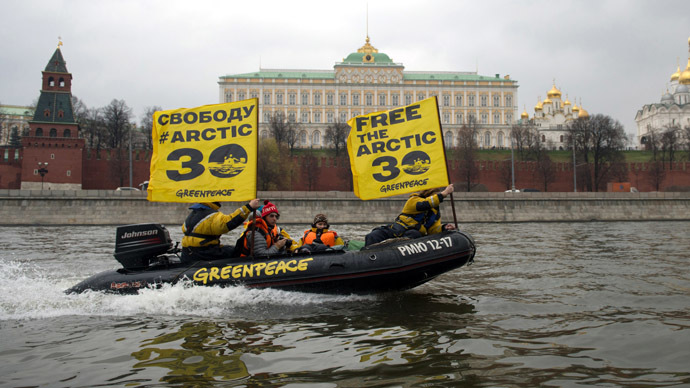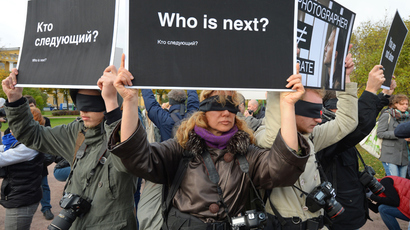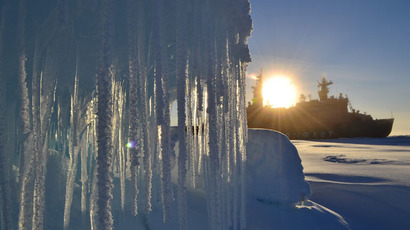‘Winter is coming’: Dutch tell UN court Russia breached international law, must free Greenpeace activists

The Netherlands has demanded that Russia free all 30 Arctic Sunrise activists detained in Murmansk at an international tribunal in Hamburg. Greenpeace protested Russia’s boycott of the hearings by sailing along the Moscow River in boats.
The International Tribunal for the Law of the Sea on Wednesday
held a hearing into the Arctic Sunrise icebreaker and its crew,
who attempted to board a Russian oil platform in the Arctic in
September. All 30 activists were arrested and are still detained,
and the ship was towed to Murmansk by Russian authorities.
The case against Russia was in October brought to the tribunal by
the Netherlands, under whose flag the Arctic Sunrise was sailing.
A Dutch government representative, Liesbeth Lijnzaad, claimed
Russia had “violated the human rights” of the activists
trying to climb onto Russia’s first offshore Arctic oil rig in
what they described as a peaceful protest.
The Netherlands demanded in court that all the activists be
released.
According to the Dutch, Russian coast guards’ boarding of the
Arctic Sunrise was “internationally wrongful,” breaching
the UN Convention on the Law of the Sea and customary
international law. All subsequent acts – such as arrests and
prolonged detention – were “wrongful” as well, they
claimed.
Greenpeace said that the Arctic Sunrise did not breach the
500-meter safety zone of the drilling platform, and that it was
arrested in international waters, where the vessels may not be
boarded, inspected or detained except with the permission of the
flag state.
The Dutch government “did not consent” to the boarding of
the Arctic Sunrise by the Russian authorities, its
representatives said.
Prof Liesbeth Lijnzaat, Dir. Legal Affairs of Dutch MFA introduces Dutch delegation and commences #ITLOS pleadings pic.twitter.com/ZEQCDL3Bx7
— Jasper Teulings (@Patagorda) November 6, 2013
While the Dutch government “regrets Russia’s
non-appearance” in court, Russia is bound by the outcome
regardless of its presence at the hearings, the representatives
said.
The Russian Foreign Ministry said last month it does not accept
the arbitration procedure and would not send its representatives
to the hearing, as the country does not have to participate in
disputes that concern “sovereign rights and jurisdiction.”
International supporters of the Greenpeace activists have also
claimed they are being detained in poor conditions. Last week
Greenpeace lawyers said they may all soon be moved from a
pretrial detention center in Murmansk to St. Petersburg, although
the reasons for such a transfer remained unclear.
“Winter is coming. My government prays the Arctic Sunrise and
its crew are returned home before winter sets in,” the Dutch
spokesperson said.
Greenpeace lawyer Daniel Simons also spoke in court, claiming
that the organization’s legal team has “not been able to
identify any Russian rule prohibiting entry of a safety
zone.” The activists were thus told the protest was
“entirely safe,” he said.
What both the Dutch and Greenpeace failed to mention was Russia’s
repeated warnings regarding the vessel’s provocative actions in
the Arctic. According to RT’s official sources, the warnings were
completely ignored by the Netherlands.
In August, the Russian Embassy in The Hague in particular warned
the Dutch Foreign Ministry that the Arctic Sunrise’s voyages
along the Northern Sea Route without Russian permission were
unacceptable.
The Hamburg court hearing also ignored Russia’s security
concerns, last week reiterated by Prime Minister Dmitry Medvedev.
Greenpeace activists posed a threat for both the Russian oil rig
workers and the environment by disturbing work at the platform,
Medvedev said.
The court order date was tentatively set for November 22,
Greenpeace said on their website following the hearing. While the
maritime court’s decisions are binding to all the signatory
countries of the 1982 UN Convention on the Law of the Sea,
including Russia, it has in effect no means of enforcing them.
Meanwhile, in Moscow Greenpeace activists staged a protest by
sailing in boats along the Moscow River through the city center,
holding flags that read “Free the Arctic 30!” The aim of the
action was to draw public attention to the case and to protest
Russia’s refusal to take part in the Hamburg hearings, Greenpeace
said.
Russia initially charged all 30 Arctic Sunrise crewmembers from
18 different countries with piracy, which carries a maximum
penalty of 15 years in prison. Russia’s Investigative Committee
later stated that the case has been reclassified as one of
hooliganism, carrying a maximum penalty of seven years.
However, Greenpeace international general counsel Jasper
Teulings, speaking to Reuters on Wednesday, claimed that
“nothing has changed,” and that all the activists are
currently charged with “both hooliganism and piracy.”
Russia has said that it remains “open to the settlement”
of the situation surrounding the case outside the tribunal. Last
week, Moscow and Amsterdam were holding informal talks to resolve
the situation, according to reports confirmed by the Dutch
Foreign Minister’s spokesman Ward Bezemer. While he did not
disclose the details of the negotiations, he said that there was
no secret or controversy regarding the talks.
Before turning into an international scandal, the Arctic Sunrise
action was intended as a protest against drilling for oil in the
Arctic. Greenpeace said its activists wanted to put a banner on
the Prirazlomnaya rig owned by Russian state-run gas giant
Gazprom to bring public attention to their claim that it is
impossible to sufficiently clean up potential oil spills in the
Arctic region.














